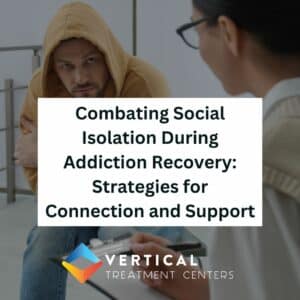
Combating Social Isolation During Addiction Recovery: Strategies for Connection and Support
Despite the strides made in addiction recovery methods, the cruel sting of social isolation remains a significant roadblock, often increasing the struggle for those on a path to sobriety. This post aims to shed light on social isolation in addiction recovery and provide viable strategies to combat this common but under addressed issue.
Understanding Social Isolation in Addiction Recovery
Social isolation, characterized by a lack of social interactions or support networks, can be a menacing pitfall for those in addiction recovery. This isolation not only has potential consequences on mental health, manifesting as depression or anxiety, but also exacerbates the risk of relapse, adding another complex layer to the battle against addiction.
Recognizing the Signs of Social Isolation
Emotional and Behavioral Indicators
Individuals experiencing social isolation during addiction recovery may exhibit emotional changes such as persistent sadness, feelings of emptiness, or lack of motivation. Behavioral signs might include withdrawal from social activities they once enjoyed and a marked decrease in communication with family and friends.
Physical and Environmental Indicators
Physical manifestations of social isolation can include significant changes in sleep patterns or appetite. Environmental signs could involve living or spending a majority of the time alone.
Strategies for Combating Social Isolation
Building a Support Network
The cornerstone of battling social isolation in addiction recovery lies in the power of a supportive network. This community could include family members, friends, therapists, or mentors who understand the recovery process. To build this, openness about your struggle is pivotal. Regular check-ins, shared activities, and open conversations can enhance these connections.
Joining Recovery Communities
Joining support groups, 12-step programs, or online recovery forums can be hugely beneficial. These platforms provide an environment where those in recovery can relate to each other’s experiences, providing empathy and support. Local health societies or online platforms like Recovery.org can help locate these resources.
Engaging in Social Activities
Taking an interest in social activities or pursuing a hobby that involves others can boost connection. Volunteering, joining local clubs, or fitness groups can be a step forward in mitigating isolation.
Utilizing Technology for Connection
Technology can safely bridge the gap between isolation and connection. Use of social media platforms, video call apps, or virtual support groups can encourage communication and bolster your support network.
Overcoming Barriers to Connection
Addressing Stigma and Shame
Battling the stigma and feelings of shame associated with addiction is crucial. Practice self-forgiveness, focus on your recovery journey, and consider therapy as strategies to overcome these barriers.
Dealing with Fear and Anxiety
Fear and anxiety can be significant obstacles in the fight against social isolation. Taking small steps to gradually increase socialization, practicing mindfulness, and speaking openly about these fears with your support network can be immensely beneficial.
Conclusion
Combating social isolation is a critical aspect of addiction recovery. By recognizing the signs and implementing strategies for connection, one can navigate the path to sobriety with an arsenal of support. Remember, you are not alone in this journey, and drawing on collective strength and connection can lead to hopeful, meaningful change.